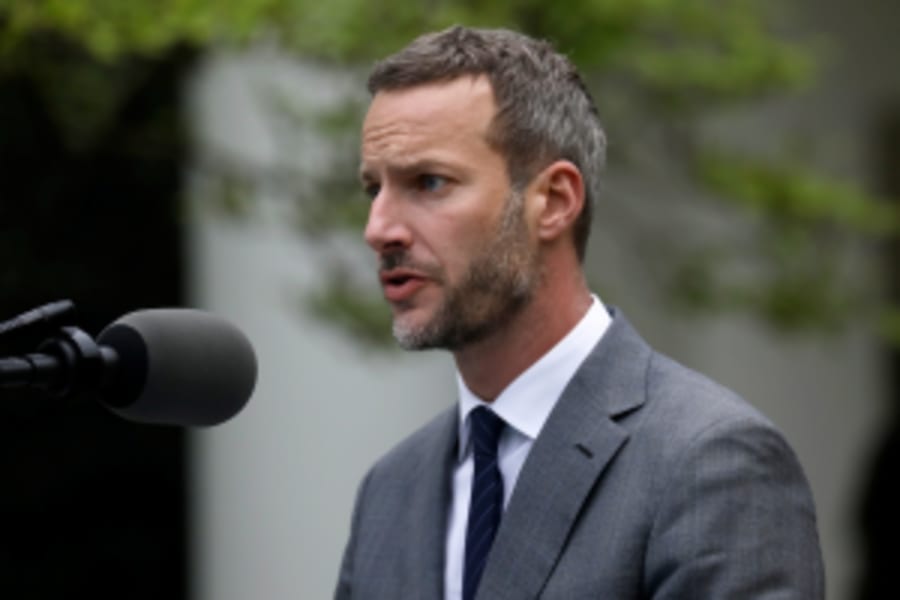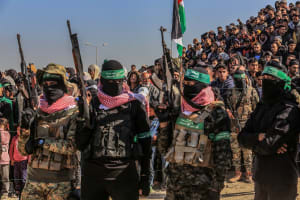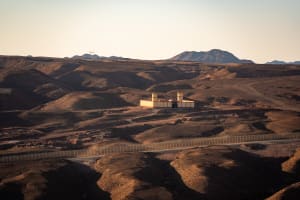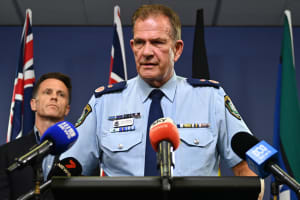20 years after 9/11, CBN News program, ‘Jerusalem Dateline,’ devotes entire 30-minute episode to covering ‘Enemies and Allies’ book
Watch full program, including exclusive interview with ALL ISRAEL NEWS founder
Threats from radical Islamist organizations, including ISIS and al Qaeda, are not the same magnitude they once were, but on the other hand Iran is more menacing as it forges ahead to nuclear capability.
That was the assessment of Joel Rosenberg who was interviewed on the Christian Broadcasting Network's popular program, Jerusalem Dateline. Rosenberg discussed his new book, “Enemies and Allies: An Unforgettable Journey inside the Fast-Moving and Immensely Turbulent Modern Middle East.”
Rosenberg’s interview with CBN host Chris Mitchell chronicled the historic changes in the Middle East since the events of 9/11, including the Abraham Accords peace agreements. He described the three main sections of the book: enemies, opportunities and the future.
“The good news is some of the major non-state terror organizations and actors are not the magnitude of the threat that they once were. The bad news is that, in all of the chaos of the Middle East over the last 20 years, Iran is more dangerous today than ever before and they are dangerously close to building not just one nuclear warhead, but an entire arsenal.”
“Iran's leadership are driven by an end times radical apocalyptic eschatology that believes that at the right moment, the ayatollahs will be able to annihilate Israel – which they call the Little Satan - and that's only their first objective. Ultimately, they want to annihilate, destroy the United States, which they call the Great Satan.”
Rosenberg also discussed the danger of Iran’s current strategic alliances with Russia, Turkey, North Korea and China.
“But one of the silver linings is that the threat posed by Iran and its enemies is it is totally causing Arab leaders in this part of the world to fundamentally rethink who is my enemy and who is my ally,” Rosenberg said.
Rosenberg described behind-closed-doors conversations with some of the most prominent Arab leaders in the region that led to the signing of the peace agreements, in particular his visits to the palace of Crown Prince Mohammed bin Zayed (MBZ) of the United Arab Emirates.
“For the first time Evangelicals had ever been invited as leaders to come and meet with all the senior leadership of the United Arab Emirates," Rosenberg recounted. "At the time, this was off the record, but now in the book and now with you, I can say MBZ leaned forward, and he said, ‘Joel, I'm ready’. I'm like, ‘What?’ He said, ‘I'm ready to make peace. I want to make peace with Israel.’"
Rosenberg shared his enthusiasm for the recent peace agreements between Israel and its Arab neighbors.
“God has open doors that I can't explain how those doors open. I mean, God did it… Why he allowed me to bring other Evangelical leaders with me to go meet with all the top kings, crown princes, presidents and prime ministers of this region? I can't explain God's sovereign purposes. But he gave us a front row seat…”
Rosenberg also spoke about the current state of affairs in the Middle East through the lens of the scriptures, specifically as it relates to prophecy. Some of the major end-times prophecies are covered in the last section of "Enemies and Allies."
“Of course, the main one here would be Ezekiel 38 and 39, what's known as the War of Gog and Magog, where in my analysis, I believe that prophecy is dealing with a dictator who rises in Russia and builds a military strategic political alliance with the leaders of Iran, then known as Persia and Turkey, and several other countries in this region, to surround Israel in the last days of history and try to consume Israel.”
“This region forces you to pay attention, and it has an effect spiritually and geopolitically. And I think that the 20th anniversary of 9/11 is the right moment to reassess 20 years after that horrific series of attacks," Rosenberg concluded. "Who are our enemies and who are our allies? And how should we live different and pray different as Christians in light of these truths?”
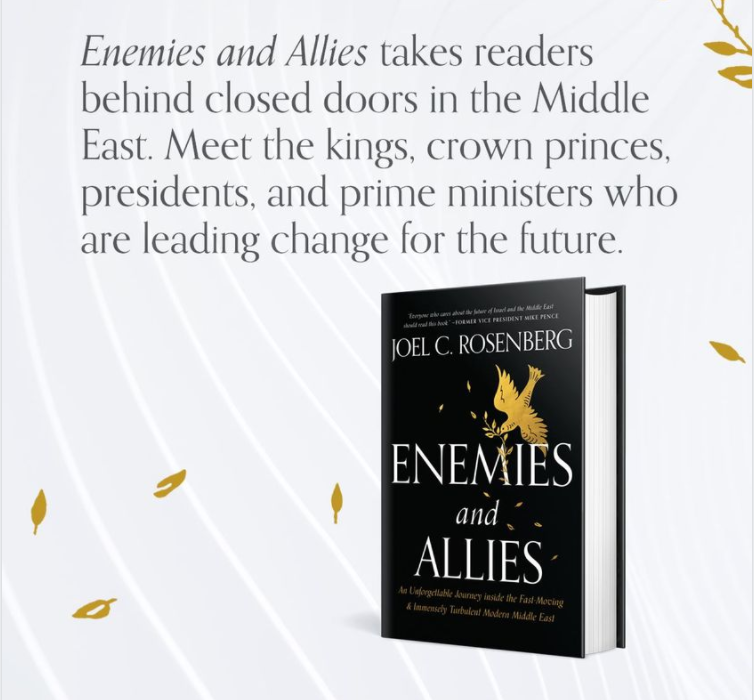
Here is the full transcript:
INTRO: This week on Jerusalem Dateline, a special program marking 20 years since 9/11 with New York Times bestselling author Joel Rosenberg. His book, “Enemies and Allies,” chronicles the historic changes in the Middle East. A prophecy is unfolding and what the future holds for this volatile region. This week on Jerusalem Dateline.
CHRIS MITCHELL Hello and welcome to this special edition of Jerusalem Dateline. I'm Chris Mitchell. Twenty years ago, what happened on 9/11 changed the world. During the past two decades, the Middle East has gone through a dramatic transformation. Joel Rosenberg chronicled those changes in his book, “Enemies and Allies: An Unforgettable Journey inside the Fast-Moving and Immensely Turbulent Modern Middle East.” CBN News sat down with Rosenberg in this exclusive interview.
Joel, great to be with you again here in Jerusalem with amazing view here.
JOEL ROSENBERG: Joy to be with you at the epicenter of the epicenter to talk about what in the world is going on in this region.
MITCHELL: Well, you've written a book called “Enemies and Allies.” First of all, tell us why you wrote the book.
ROSENBERG: Well, there's a couple of things. One, of course, with the 20 years that have gone by since the horrific attacks of Sept. 11, 2001. One of the questions that people have is where are we in our battle with radical Islamism? We've gone through multiple cycles. We've been in an almost 20-year war in Afghanistan. We were in a war for many of those years in Iraq. We have been in battle, or at least in counterterrorism operations, in Syria, in Yemen, in Libya and throughout this region. ISIS didn't even exist 20 years ago, right? But the Islamic State surged into power and created a caliphate and literally engaged in genocide. The U.S. Congress defined it as genocide. The Obama administration reluctantly but eventually defined what ISIS was doing as genocide against Christians. They were slaughtering Muslims by the millions or by the hundreds of thousands. But they were purposely trying to liquidate, annihilate the Christian population and Yazidis as well.
So where are we with al-Qaida? Where are we with ISIS? And of course, the biggest threat in the whole region back 20 years ago and more today than ever is Iran and the Iranian regime. But I really felt that the threats in the Middle East, in the Islamic world, are changing so much and in some areas growing so grave and dangerous that we had to take a new look at it. And then, of course, there's the Abraham Accords and the whole move towards Arab-Israeli peace. So which is it? And that's where enemies and allies looks at. Who are our enemies two decades after 9/11, and who are our allies? Because in both of those areas, the deck of cards, as it were, has been reshuffled.
MITCHELL: So the book is in three main parts. You have enemies, opportunities and future. First of all threats - the enemies. What's the main threat here in the Middle East right now?
ROSENBERG: My basic assessment is that 20 years after 9/11, al-Qaida is on the run. It's not gone and you can't take your eye off it, but it's not the power player that it once was.
MITCHELL: Osama bin Laden?
ROSENBERG: Osama bin Laden is gone. Most of the senior leadership of al-Qaida have been taken off the battlefield. And that's encouraging. The Islamic State, the caliphate, is gone. The millions and millions – almost 5 million people that were living under the slavery, under the tyranny of the caliphate – have been liberated. Abu Bakr al-Baghdadi, the spiritual and political military leader of ISIS, has been eliminated and most of their leadership has been, too. So, the good news is some of the major non-state terror organizations and actors are not the magnitude of the threat that they once were.
The bad news is that in all of the chaos of the Middle East over the last 20 years, Iran – no matter what the United States and Israel has done – Iran is more dangerous today than ever before and they are dangerously close to building not just one nuclear warhead, but an entire arsenal. They have also built out their ballistic missile force – not only to be able to reach here in Israel, but to be able to reach Europe. And they're getting closer to being able to reach the United States with intercontinental ballistic missiles. And Iran's alliances – I really spend a lot of time in the book - their alliances are more dangerous than ever. They've built this really close strategic alliance with Russia, with Turkey, with North Korea and increasingly with China. Now, each of those alliances look a little different, but they are dramatically stronger. Iran's regime is dramatically stronger today because they have these anti-American, anti-Western and very hostile enemies as their allies. And several of those countries, of course, are nuclear armed themselves, which makes the Iranian nuclear threat even more dangerous.
MITCHELL: Plus, they've built up proxies throughout the region. Iranian militias and in Iraq, Hezbollah, Hamas, the Houthis down in Yemen as well, almost surrounding Israel, as well as some of the Sunni Arab nations.
ROSENBERG: And I think that the countries that have allied themselves with Iran's regime, I don't think they understand who they're in bed with. I think all of those leaders in all of those countries believe they are using Iran to poke in the eye of the United States, and to mess with Israel and the Western alliances. I don't think that these leaders and nations believe that Iran is setting the agenda, that Iran is setting the pace, that Iran has genocidal ambitions. The Iranian leadership doesn't want to just improve their position in the region. Iran's leadership are driven by an end times radical apocalyptic eschatology that believes that at the right moment, the ayatollahs will be able to annihilate Israel – which they call the Little Satan - and that's only their first objective. Ultimately, they want to annihilate, destroy the United States, which they call the Great Satan. And I don't think Putin or the Chinese leadership or Recep Erdogan and the great leader in Pyongyang, North Korea, I think they are seeing Iran as part of an anti-Western, anti-American alliance. Let's just get everybody who hates America and hates the West. Let's get them all in one big, semi unhappy family. I don't think they realize. Exactly who they're in bed with. When it comes to the Iranian regime.
MITCHELL: Well, Israel in the region faced fierce enemies like the Islamic Republic of Iran, major opportunities for cooperation and peace have emerged in the Middle East. Opportunities many never expected.
Well, the second part of the book is called Opportunities, the allies in the in the book. Tell us about that and you've been a part of that in the sense of meeting many of the leaders here in the Middle East that have become opportunities.
ROSENBERG: One of the silver linings to the darkening clouds here in the region as the enemies coalesce into it an alliance, really – it's not just that they’re individual enemies – that they're building an alliance against the United States, against NATO, against Israel. But one of the silver linings is that the threat posed by Iran and its enemies is it is totally causing Arab leaders in this part of the world to fundamentally rethink who is my enemy and who is my ally. Historically, for the last hundred years, the Arab world has seen Israel as their number one enemy, and they've hated the United States because the United States has treated Israel as their number one ally in this region. But everything is changing, and that's what's so fascinating is that, you know, I've had this opportunity. God has open doors that I can't explain how those doors open. I mean, God did it. Why he did it with me? Why he allowed me to bring other Evangelical leaders with me to go meet with all the top kings, crown princes, presidents and prime ministers of this region? To bring the Christian Broadcasting Network with me on all of those trips. I can't explain God's sovereign purposes. But he gave us a front row seat for the other big story in the Middle East over the last 20 years.
The first story being the enemies are growing more dangerous and they're coalescing into a team. But the other story is the Arabs are rethinking fundamentally what they think of the United States and, more importantly, what they think of Israel. We were sitting in the palace in Abu Dhabi, the political capital of the United Arab Emirates, with the leader of that country, Crown Prince Mohammed bin Zayed, affectionately known as MBZ. We were there in October 2018. There was no talk of Abraham Accords. There was no talk on the horizon of an Arab-Israeli peace treaty. But MBZ invited me to bring a delegation. For the first time Evangelicals had ever been invited as leaders to come and meet with all the senior leadership of the United Arab Emirates. At the time, this was off the record, but now in the book and now with you, I can say MBZ leaned forward, and he said, ‘Joel, I'm ready’. I'm like, ‘What?’ He said, ‘I'm ready to make peace. I want to make peace with Israel.’ I said, ‘Even if the Palestinians are not ready?’ ‘Even if the Palestinians are not ready.’
So we ended up having this fascinating behind-closed-doors conversation in the palace, in his living room. What do you mean? How have you gotten there? What would it take to get to an actual agreement? And we walked out of that palace knowing that United Arab Emirates was going to go make peace with Israel, but we were not allowed to say anything. And less than two years later, MBZ was the first one. Yeah, I was here when the announcement was made in August, and I started getting texts from senior advisors to the crown prince. ‘Watch your news. We're about to make the decision. It's coming.’ And it was huge. And then, yes, I was very humbled to be invited by the White House to be there on the South Lawn of the White House as the United Arab Emirates, then Bahrain and Israel and the United States signed the Abraham Accords. I mean, this is crazy. The fact that one Arab country was ready, but within days the Bahrainis came forward and then wasn't that long after that, that the Sudanese said, ‘We're ready.’ And then the Moroccans and then non-Arab, but still Muslim, Kosovo came forward and said, ‘We're ready to make peace and normalize our relations with Israel.’ This is huge.
And I think for many Americans, particularly American Christians, but also Christians all over the world. COVID was a year that was so dark. Healthwise, so dark economically, and of course, in the United States – race riots, churches closed, not being allowed to open, a massively divisive political presidential campaign. There were so many issues on the table in the United States and around the world. Almost nobody really paid attention to the biggest series of Arab-Israeli peace treaties in history since the Egyptians and the Jordanians. So again, this is the first book, Enemies and Allies, that takes you into the actual palaces – takes you inside the rooms as you meet the very men who made these decisions. Why did they do it? What are their values? How do they change from being people who were united against Israel for the last hundred years? Economic boycotts, some of them actually actively engaged in war. How did they change? The Iranian leadership is a big part of why they changed. They fear Iran. They, as Arab leaders, are not sure. Will the United States stand with them? They're not sure, but they are sure that the Israeli nation, the Israeli leadership, would be with them in a fight to the death against the Iranian regime. And that, a lot of prayer by Christians all over the world, it's a great testimony to the praying for the peace of Jerusalem.
MITCHELL: From the words of Jesus to the Hebrew prophets, the Bible has a lot to say about the end times. We discussed the current state of affairs in the Middle East through the lens of the Scriptures.
Do you see any prophetic elements in these, this axis of Russia, Iran and Turkey?
ROSENBERG: I do, Chris and I write about it in the book. You know, I deal in one of the sections about how do Christians – and particularly Evangelicals – how do we see Israel and the Middle East? If I'm dealing with this book that's covering how the Iranians see us, how Israel sees them, how the Arabs see Israel, how the Arabs see Iran, all these different angles. And I've been invited to go meet with so many of the leaders in this country and in the region with you, with me as an Evangelical. So I thought, I need to have some element of this book that briefly looks at what do Evangelicals think? And of course, Evangelicals don't all agree on issues of prophecy, but I lay out some of the major prophecies. Of course, the main one here would be Ezekiel 38 and 39, what's known as the War of Gog and Magog, where in my analysis, I believe that prophecy is dealing with a dictator who rises in Russia and builds a military strategic political alliance with the leaders of Iran, then known as Persia and Turkey, and several other countries in this region, to surround Israel in the last days of history and try to consume Israel.
Israel has to be reborn as a country. That's the prerequisite. Well, here we are. The prophecies say that Israel has to rebuild the ancient ruins. It has done so that Jews have to be flowing back into the land after centuries of exile. Well, we know that's come to pass and it's continuing to come to pass. And Israel has to be prosperous. Israel is more prosperous today than any other time in its modern history. And Israel has to be feeling secure now. That's an open question, whether that box can be considered checked. But in the grand scheme, most Israelis feel like, ‘Yeah, OK, we understand that people hate us. But we are more secure today than at any other time in the history of the Jewish people going back to King David and King Solomon.’ So that's really interesting, right? I'm not saying that I know that we are close to seeing Ezekiel 38 and 39 unfold, but most people who are going to be reading this book have never really thought much about those prophecies, and they're worth understanding.
MITCHELL: From enemies to opportunities to the end times, what does the future hold for this region and what impact will it have on the rest of the world and your life?
In the last section of your book, Joel, is the future. What do you see for the future here in the Middle East?
ROSENBERG: Well, I think there are two contradictory crosscurrents going on in this region. The positive trend line is Arab and Israeli peace is breaking out, historic game changing tectonic shifts in thinking. It's not just about a couple of regional leaders sitting down and signing some papers. No, I've been to the United Arab Emirates, for example, twice since the Abraham Accords were signed and it is warm, and they are welcoming, and they love it that you're Israelis. We've had conferences there. We've had meetings with leaders, with individuals. They are so excited. It's such a warm peace. I've also been to Bahrain since the Abraham Accords were signed. Same thing. They're so excited. They feel so strongly, it's time. Yes, we disagree with Israel on various things, but wow, so that's huge. This is not just one leader or two, you know, changing their mind. Egypt's leader in 1979, starting in ‘77, then ‘79. Anwar El-Sadat, president of Egypt. He's the one who had ordered the Yom Kippur invasion by Egyptian and Syrian forces to try to destroy Israel. But he was also the one that came here to Jerusalem to make peace. But that was pretty much his own individual decision, and most Egyptians were not happy with it. They didn't want to send their sons and daughters to war, but they weren't interested in peace with Israel. But the Emirati people want peace. The Bahraini people want peace. I think the Moroccan people want peace. So I think that's the positive trend line. But the negative trend line is just as real. And that is, Iran is dangerously close to being able to build not just one nuclear weapon, but a full arsenal of nuclear weapons. They have the ballistic missiles that can reach Israel, and soon they will have those missiles that can reach the United States. All the more we need to pray for the peace of Jerusalem.
MITCHELL: And how about the future for Evangelicals here in the region?
ROSENBERG: Well, I think what we've watched over the last 20 years is Christians go from being in grave danger in much of the region because of radical Islamism attacking churches, burning them down, beheading Christians, slaughtering Christians, enslaving Christians. We've seen it from Libya and Egypt to Yemen and certainly Syria and Iraq. The worst of that is over right now. We're not seeing slaughter and more and more Arab governments are moving to defend Christians, even rebuild our churches and stand with us. That's encouraging. But most Christians in this region, except in Israel, but most in the region don't have the level of freedom that Muslims have here or that Muslims have in the United States. So I want to continue to be an advocate for the expansion of religious freedom in this region. I've spoken at the State Department's ministerial and religious freedom at the invitation of Secretary Pompeo and then Ambassador for Religious Freedom Sam Brownback. Both are wonderful friends and wonderful Christians. And so I describe sort of a survey. It's brief, but I describe a survey of the good, the bad and the ugly when it comes to religious freedom here in the book. And I think there's a lot to do, and I think I know there's a lot of other issues that Christians in the United States and elsewhere have. We're starting to lose our freedoms in the United States. That's a problem, but we really have to stand with our brothers and sisters here in this region. And we also have – one other thing and talk about it in Enemies and Allies.
Unfortunately, much of the media in this part of the world has become an enemy, enemy of Israel, enemy of Christians, enemy of truth. And that's one of the reasons we started ALL ISRAEL NEWS and our sister site, ALL ARAB NEWS. In fact, I dedicate Enemies and Allies to the staff and the board of our two news sites because truth is under siege here. And I think Christian Broadcasting Network has done an amazing job over the years, but I would say, may your tribe increase. There is so much good happening in this region, but there's also so much danger in this region. And maybe I'll close the interview the way I open the book. I say that, ‘it's been long said about Las Vegas that what happens in Vegas stays in Vegas,’ but nobody says that about the Middle East. What happens here has an effect. It has an effect on the rest of the world. It has an effect on the church. It has an effect on oil prices, on energy prices, on inflation, on currencies and politics, on people who serve in the military. This region forces you to pay attention, and it has an effect spiritually and geopolitically. And I think that the 20th anniversary of 9/11 is the right moment to reassess 20 years after that horrific series of attacks. Who are our enemies and who are our allies? And how should we live different and pray different as Christians in light of these truths?
MITCHELL: Well, that's all for this special edition with Joel Rosenberg, author of Enemies and Allies. If you're interested in knowing more about the times we're living in, it's a great book that you can purchase almost anywhere. Thanks for joining us.

The All Israel News Staff is a team of journalists in Israel.


